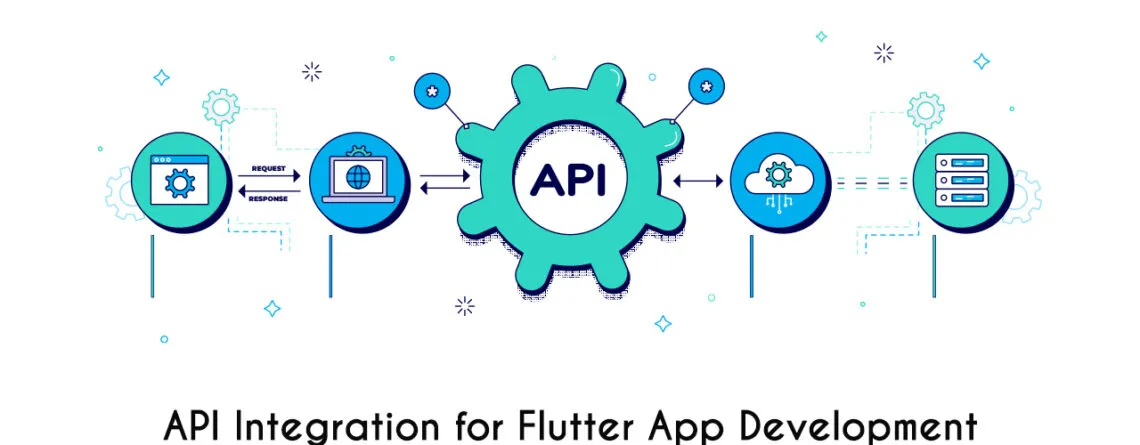API Integration for Flutter App Development
Flutter is an open-source and highly competent UI software development kit. It is Google’s own creation, which means it is empowered with powerful tools like design-specific widgets, AOT compilation, and support for platform-specific SDKs.
But what increases the potency of Flutter app development is API integration, a coding technology that is getting a lot of attention these days. Flutter has already made a mark in the app development industry for the creation of functional cross-platform apps from a single codebase but with API integration, it can do a lot more.
But what is API integration? Why do SMEs need it and what are the different types of API integration that you can get in Flutter? Let’s take those one at a time.
What is API Integration?
API (also known as Application Programming Interface) integration is a process of linking two or more software systems, platforms, or applications to exchange data and functionality between them.
You can think of API integration as the interface that enables different systems to communicate and exchange information, without requiring human interaction or manual intervention.
Some common use cases of API integration include:
Data exchange: API integration enables the exchange of data between different systems, such as transferring customer information from a CRM system to an e-commerce platform.
Platform integration: It is used to connect different platforms, such as integrating a payment gateway API into websites or apps.
System integration: API integration can be used to connect different systems within an organization, such as integrating an ERP system with a company’s internal database.
Service integration: It can also connect different services, such as integrating a weather API into a travel website to provide current weather information to users.
Why do SMEs need API Integration Services?
The complexity of applications has increased owing to the rapid evolution of technologies and varied customer demands. A big reason for adopting API integrations is to enhance an app’s functionality and make it capable of catering to customers’ diversified needs. Other key reasons include:
Process automation: API integration can automate various processes, such as the exchange of data between different systems, thus reducing manual labor and increasing efficiency.
Secured Information Exchange: A big reason to go for API integration solutions is the secured exchange of information among platforms. Custom API solutions have different security layers incorporated to ensure a safe transaction, especially for functions like online payments and net banking.
Improved data flow: It improves the flow of data between different systems, enabling businesses to make informed decisions based on accurate and up-to-date information.
Enhanced user experience: With API integration, businesses can enhance the user experience by providing a seamless flow of information between different systems and services, making it easier for users to access the information they need.
Increased competitiveness: API integration can enable businesses to connect with other systems and platforms, providing access to new customers, markets, and services.
Flexibility and scalability: API integration can provide businesses with the flexibility to add new systems, platforms, and services as their needs evolve, enabling them to scale their operations to meet changing business requirements.
Types of API Integration Services for Flutter Development
Payment Gateways
Payment gateway API integration refers to the integration of a payment gateway API into a website or application to enable the processing of online payments. A payment gateway API acts as a bridge between the merchant’s website and the acquiring bank, allowing for the secure transfer of payment information from the customer to the bank for processing.
This API integration service is a crucial aspect of e-commerce and can significantly impact the success of an online business. Businesses can provide customers with a secure and convenient way to complete transactions, increasing sales and customer satisfaction.
Payment gateway APIs also enable web and mobile apps to accept and support multiple payment methods including credit and debit cards, e-wallets, and alternative payment methods, making it easier for customers to complete transactions.
Cloud API Integration
Cloud API integration refers to the integration of cloud-based services into software applications through APIs. This integration enables developers to leverage the scalability, security, and reliability of cloud services to build and deploy applications faster and more efficiently.
A huge benefit of cloud APIs is access to a wide range of advanced features, such as machine learning, big data analytics, and artificial intelligence, enabling developers to build more sophisticated applications.
Additionally, cloud APIs can reduce the costs associated with hosting and maintaining application infrastructure, making it more affordable for businesses to build and deploy applications. It also enables businesses to scale their apps accordingly with increased traffic or usage since cloud services can provide virtually unlimited resources.
Healthcare App API Integrations
API Integration can prove extremely useful for healthcare applications. Since COVID has necessitated telehealth care, medical institutions are now moving towards digital solutions, especially through apps.
With API integration, one can improve patient engagement by incorporating features like prescription refill requests, secured messaging, and appointment scheduling.
Another huge advantage of API integration is enabling safe access to medical records. By integrating APIs of healthcare providers, an app can fetch real-time data like test reports, and medical history. These features can help medical professionals take informed decisions and improvise patient care.
Third-party API Integration
Third-party API integration refers to the integration of APIs provided by external companies into a website or application. This integration enables businesses to access and leverage the functionality, data, and services provided by third-party companies, such as social media platforms, Google Maps, booking, and more.
Third-party is highly beneficial in providing a wide range of functionality and services thereby enabling businesses to add new capabilities to their applications. For example, a travel app can integrate services with booking APIs of a third-party service provider which shall allow users to search and find accommodations right from the app.
Third-party API integration services can enhance the user experience by providing access to data and services from external companies, enabling businesses to offer more personalized and relevant experiences to their users.
It can also provide access to high-quality data and insights, enabling businesses to make data-driven decisions and improve their operations.
Custom API Integration
Custom API integration refers to the process of integrating a custom API into your application or system. Custom APIs are specifically developed to meet the unique requirements and specifications of an organization.
The integration process involves connecting an application or system to the custom API, allowing it to communicate and exchange data with the API. The process of custom integration involves writing code to interact with the API and handling responses, as well as testing and debugging the integration.
Its biggest benefit is that custom APIs can be designed with security in mind, helping to protect sensitive data and ensuring that only authorized users have access. Also, custom APIs can be designed to meet specific business requirements, providing more functionality than a standard API.
Conclusion
API integration is an important aspect of modern software development and can provide significant benefits to businesses, including access to advanced functionality, increased efficiency, improved user experiences, and cost savings.
With API integration, businesses not only enhance the capabilities of their Flutter applications but also improve customer and partner management. However, there are certain technical and security-related aspects that need to be considered at architecture, infrastructure, and API development levels, to ensure the exchange of information is robust, speedy, secure, and meets the compliance thresholds.
It requires hands-on experience and solid expertise – via a dedicated team of skilled developers. As an ingrained software development company, People Tree has the right mix of experience and expertise to help you with your API architecture, setup, development, and integration requirements.
In order to know more about our API integration services, connect with us at tech@people-tree.com.
#api #apiintergration #flutterapi #fullterapp #flutterappdevelopment #apiservices









